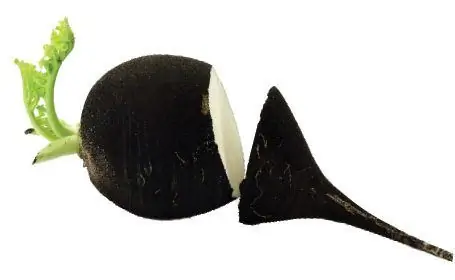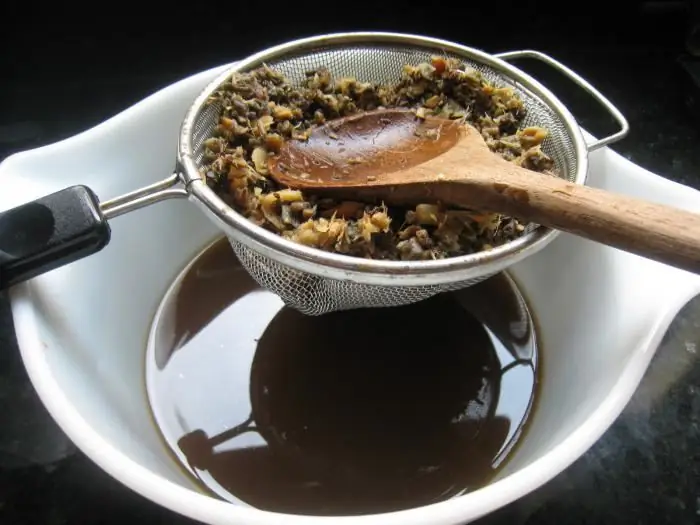2026 Author: Priscilla Miln | miln@babymagazinclub.com. Last modified: 2025-01-22 17:55:26
Adenoiditis is a disease that often occurs in children against the background of hypertrophy of the pharyngeal tonsil. The disease is a chronic, subacute and acute inflammatory process. Adenoiditis can also disturb an adult. Most often, this phenomenon occurs due to an enlarged and not removed in time tonsil.
It is worth noting that with such a disease, inflammation is of an infectious-allergic nature, since it is caused not only by bacteria, but also proceeds with a violation of immunological reactions. The most common symptom is a cough with adenoids. Treatment is a long and complex process.

Why does adenoiditis occur
Most often there is a cough with adenoids in children aged 1.5 - 14 years. In adults, this symptom is extremely rare. In this case, the inflammatory process may be a complication of SARS or a cold. Often, adenoiditis occurs during the course of diseases such as sinusitis, pharyngitis, tonsillitis and other ENT diseases.pathology. Acute inflammation of the pharyngeal tonsil is an unpleasant ailment that is accompanied by a cough.
Causes of cough
Cough with adenoids is a clinical sign of a disease that occurs due to direct irritation of the nasopharyngeal nerve roots by secreted mucus or pus. A similar symptom develops during the course of the infectious process. Adenoiditis is characterized by a rapid and acute onset, accompanied by an obsessive cough. Most often, the symptom bothers at night.
With a sluggish chronic disease that develops with hypertrophy of the pharyngeal tonsil of 2 or 3 degrees, a cough often occurs, which is permanent (adenoid cough). The symptom worries the patient at night, when a child or an adult assumes a horizontal position. There are several reasons for coughing with adenoids in children:
- A reflex reaction that occurs when an irritant is exposed to receptors located in the oropharynx and nasopharynx, as well as to the pharyngeal tonsil itself. Activates at night. Most often, coughing is disturbed by the flow of mucus down the back of the throat.
- Drying of the mucous tissue of the throat and mouth at night. This unpleasant phenomenon occurs due to nasal breathing disorders.
- Swelling of the pharyngeal mucosa and its tissues. With adenoids, the vessels are constantly inflamed and become permeable.
It is worth noting that day and night cough with adenoids, as well as other disorders and changes do not cause complications and are not dangerousfor the he alth of the child. Such attacks are not able to cause the development of inflammatory processes in the bronchi or lungs. Against the background of a cough, there are no serious consequences. However, the exceptions are those cases when the inflammatory process flows from the upper respiratory tract to the lower ones.

What happens after adenoid removal
If a cough with adenoids often bothers the child, interferes with sleep at night and does not go away for a long time, then an adenotomy is performed. The procedure is the removal of a hypertrophied tonsil. Most often, after such an operation, the cough ceases to bother the child, since the main source of infection disappears. However, this does not always happen. Cough can also occur after the elimination of the organ. The symptom occurs due to the left small area of inflammatory tissue. This often happens during blind surgery. If a cough occurs several months after surgery, then this indicates a re-growth of the adenoids.
Besides this, a cough may disturb the child after the removal of the tonsil due to a better outflow from the paranasal sinuses, as the stagnant mucus begins to move away. At the same time, the inflammatory process gradually subsides. The cough may be reflex, as the mucus irritates the back of the throat. If the symptom persists for 3 weeks, it is recommended to visit a doctor to listen to the lungs.

Cough caused byallergic
Cough with adenoids is often caused by an allergic reaction. This disease affects the severity of the symptom. Otolaryngologists and pediatricians conditionally classify adenoiditis as an ailment without an allergic component or with it. However, it has its own characteristics. As practice shows, in allergy sufferers, adenoids grow much faster. As a result, they need to be surgically removed and removed more frequently.
Dry cough with adenoids can be observed not only due to exposure to an irritant, but also due to pronounced tissue edema. A similar symptom develops as a result of an allergy. This is due to the immunological reaction that occurs in the patient's body. At the local level, the process of growth of lymphoid tissue is significantly accelerated. Therefore, adenoids are often removed from allergy sufferers - the cough is constant and often dry. In this case, swelling of the tissues may occur. Treatment in this case is radical.

Features of cough
It is worth noting that a cough with adenoids in children, the treatment of which is not recommended to be postponed, has some features. However, not every doctor is able to identify it. Many experts confuse cough with adenoids with the one that occurs against the background of colds. As a result, antiseptics and antiviral agents are used to treat the disease and associated symptoms. It is worth noting that the treatment of cough with adenoids can last for several months. Solve the problem when the tonsils are runningyou can only delete them.
Doctors with sufficient experience can immediately determine the cause of a cough. With adenoiditis, the symptom has its own characteristics. Cough with such an ailment, as a rule, is dry, paroxysmal, throaty, often alternating with wet. The time of day also matters. During the day, the child may simply cough, and at night the attacks become more severe and can cause vomiting. This phenomenon is accompanied by a flow down the back wall of the pharynx of a mucopurulent or mucous secretion.

Associated symptoms
If it is impossible to determine the disease by coughing, then it is necessary to observe the child. The disease has other signs:
- Fatigue and insomnia.
- Protracted runny nose, which is practically untreatable.
- Swelling of the nasal mucosa. In this case, there may be characteristic discharge.
- Violation of nasal breathing. As a result, the child breathes through the mouth.
- Increased cough at night.
Can it be cured with drugs
Do adenoids always need to be removed? Coughing at night can be very disturbing for a child. However, in some cases, therapy of this symptom with medications is allowed. If the growth of the tonsil does not reach grade 3, then you can resort to conservative methods of treatment. At the same time, the frequency of respiratory diseases increases significantly. In addition, 6 to 10 courses of therapy are required per year. If the treatment fails, then an adenotomy is performed.

What is prescribed
So, how to treat a cough with adenoids? If a child has symptoms of a pathology, then you should immediately contact a specialist. Only a doctor is able to prescribe adequate treatment in accordance with the type of course of the disease. If acute adenoiditis is diagnosed, then only a local or systemic antibiotic will help to cope with the disease. However, such drugs are prescribed only in cases where the disease develops against the background of SARS, and is also not caused by a virus.
Cope with a cough with adenoids help drugs "Amoxiclav" and "Flemoclav". These drugs are able to quickly stop the inflammatory process, as well as calm the cough already on the 3rd day of treatment. It is strictly forbidden to reduce the course of therapy without notifying the doctor, as the infection can flare up in the body with renewed vigor.
Other Therapies
Dry cough with adenoids in children can be treated not only with medicines. In some cases, an integrated approach is required. To combat the disease and its symptoms, it is allowed:
- Perform inhalations with mucolytics, eucalyptus oil, saline, mineral water.
- Take ascorbic acid. Vitamin C is considered a general tonic and is essential for boosting immunity.
- Rinse the nose with saline or seawater-based preparations.
- Gargle with alkaline solutions and saline.
- Take antitussives with a dry cough, for example, Libexin, Sinekod, and with a wet one -mucolytics, including Linkas, ACC, Ambrobene, Bronchopret, licorice or marshmallow root syrup.
- Instill vasoconstrictor drops in the nose, for example, "Nazivin", "Tizin", "For the Nose". You can also use drugs with an antiseptic and antibacterial effect: Miramistin, Polydex, Protorgol, Isofra, Albucid.
- Irrigate the oral cavity with glucocorticosteroids throughout the milking time. It is best to use the drugs "Nasobek" and "Nasonex".
- Take antihistamines that can eliminate tissue swelling: Loratadin, Zodak, Zyrtec.
- Take homeopathic remedies that eliminate swelling and thin sputum: Umckalor, Compositum, Euphorbium, Sinupret.
- Dissolve tablets to strengthen local immunity: "Lizobakt", "Imudon".

What not to do
With a strong cough, it is not recommended to abuse lozenges, which have an antiseptic and antibacterial effect, contain menthol. Often, such drugs dry out the mucous membrane and lead to the development of an infection of a more stable form. It is not recommended to use solutions with a high concentration of s alt, and often gargle with alkaline preparations.
Finally
If a child is concerned about a cough caused by a disease such as adenoiditis, then it is necessary to strictly observe the daily routine. In this case, outdoor walks are recommended. In addition, the child should consume a large amountwarm liquid. Some experts recommend combining medical treatment with physiotherapy. With such a disease, electrophoresis, diathermy, laser exposure, tube quartz, and so on are often prescribed. If long-term treatment fails and dry cough persists, then an additional examination is required, as a result of which the doctor may prescribe surgery.
Recommended:
Coughing in a child: causes and treatment. Cough preparations for children

Coughing in a child is a fairly common occurrence faced by parents of infants and already grown children
Symptoms and treatment of adenoids in children

Often, parents seek advice from an otolaryngologist with complaints of inflammation of the pharyngeal tonsil and redness of the throat. As a result of the examination, the doctor can diagnose "adenoiditis". The article discusses what adenoids are in children, symptoms, treatment and prevention
How dangerous is a cough during pregnancy. Cough during pregnancy: treatment

In this article I would like to talk about how dangerous a cough is during pregnancy and what needs to be done to cope with this symptom. You can read about all this and much more about what is useful in this text
Dry cough in children 2 years old. Effective treatment for dry cough in a child

Dry cough in children 2 years old, as well as in older children, can incredibly exhaust both the baby and his parents. Unlike wet, dry cough does not bring relief and is not able to rid the bronchi of accumulated mucus
Chest cough collection for children. Chest collection 1,2,3,4 for cough: instructions for use

If you prefer herbal remedies, then you will be wondering when you can breastfeed a cough for children. You should not use it without the advice of a pediatrician, because the medicinal herbs included in it may not be suitable for your baby

